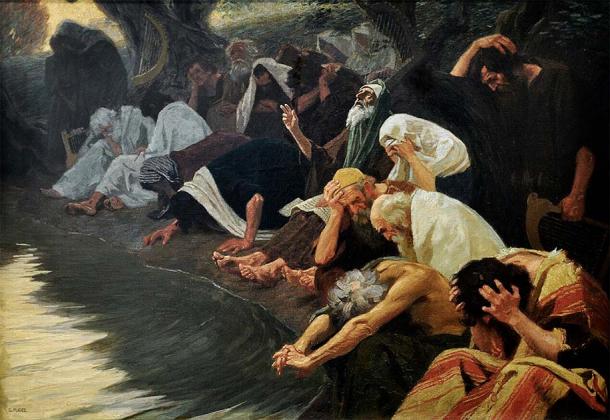Reggae Music Lyrics are Intimately Linked to Historic Babylon
Next time you find yourself swaying along to Bob Marley’s Exodus, pay attention to the lyrics. “We know where we’re going. We know where we’re from. We leaving Babylon. We going to our Father’s Land.” Have you ever wondered what “Babylon” means in this context and why Jamaican Rastafarians are singing about it?
Babylon is a recurrent trope in reggae music, a genre influenced by Rastafarian ideas which came to international attention with musicians such as Bob Marley in the 1960s. To understand the term, one needs to get down to the roots of the Rastafari movement which first appeared within impoverished Jamaican communities in the 1930s.
Born out of the repressive African diaspora experience, Rastafari religion is based on a very specific interpretation of the Bible, a unique Afrocentric blend of Christianity and Judaism. Rastas identify with the Old Testament story of the Babylonian Captivity, which tells the story of the forced deportation of thousands of Jews from the Kingdom of Judah to Babylon at the hands of the formidable King Nebuchadnezzar II in the 6th century BC.
- Life in Ancient Babylon's Thriving Jewish Community
- Egypt Remembers: Ancient Accounts of the Great Exodus

An der Wassern Babylons, by Gebhard Fugel, depicts Psalm 137 where it says: “By the rivers of Babylon, we sat down and wept”. (Public domain)
The Metaphorical Link Between Biblical Babylon and Reggae Music
This significant event, along with the siege, capture and destruction of Jerusalem in circa 586 BC, unfolded as a punitive measure after the Jewish rebellion against Babylonian dominance. Also referred to as the Babylonian Exile, this marked a period of displacement and sorrow. Their captivity in Babylon lasted for about 70 years, during which they clung steadfastly to their faith, adapting and evolving their traditions to endure the trials of exile.
The narrative of the Babylonian Captivity, etched into the collective memory of the Jewish people, underscores the enduring theme of resilience and religious tenacity in the face of adversity. The exile ended with the Persian conquest of Babylon, which allowed the Jews to return to their homeland and rebuild the Temple in Jerusalem.
Within the Rastafari world view, “Babylon” represents the corrupt and oppressive dominant society, epitomized by European colonialism, global capitalism, the police, and the African slave trade, along with the resulting racism, suffering and injustice. The “exile” resonates with Rastafari's own history of displacement and the desire for repatriation to Africa. Meanwhile, “Zion” represents the Promised Land, meaning Ethiopia or Africa, often a metaphor for a restoration of Black African pride and freedom from oppression.
One particularly powerful reggae tune was based on the Biblical Psalm 137. Rivers of Babylon, sung by the Melodians, described the Jews in exile and their shared experience of repression: “By the rivers of Babylon, there we sat down. Yeah, we wept, when we remembered Zion.”
Top image: Rastafarian playing reggae music. Source: Victor / Adobe Stock
By Cecilia Bogaard


















Comments
When Ba'al worshippers talk of The Exodus, they mean the exodus from Christ. Popular music is at the vanguard of this exodus.
When one understands the playbook, one can truly understand the lyrics. Love can be about love for the Devil. Pride can be about pride in successful deception. The 'boy upstairs' can be Lucifer, the morning star. Even the description of successful artists as 'stars' is a shout-out to Lucifer.
I could have been a professional lyricist. Easily. But I refused to work for the Devil. Many in the music industry do, at various levels. Anyone who fails to see the Luciferian themes in popular music videos is blind to it, just as those who do not hear them are deaf to it.
Modern humanity is increasingly blind, deaf and mute to the truth.
People need to stop taking things at face value. The Zion of the song mentioned is not the Zion of the Bible any more than the nation state of Israel of today is the Israel of the Bible.
One of the easiest ways to deceive is to use subtlety to change the meaning of a word. Most will not even notice the difference. In fact, some can even claim that the new meaning is the original meaning. Muddied waters spread widely.
Rastafarian music is as Christian as voodoo, or not at all. But it is Babylonian, in a sense. That thread of the article is true.
Reggae culture is linked to fake Judaism, which is modern Ba'al worship, precisely what the Old Testament warns against.
It is catchy music, but then the Devil is highly entertaining.